Moving Company: How it works & How much is the starting cost?
A moving company helps individuals and businesses relocate their belongings efficiently. Moving companies streamline the moving process by offering various services that cater to different needs, ensuring a hassle-free relocation experience.
Full-service moving includes packing, loading, transporting, unloading, and unpacking items. For instance, a full-service moving company will handle packing household goods, loading them onto the moving truck, transporting them to the new location, and unpacking them upon arrival.
A moving company typically works by first conducting a pre-move survey. This includes evaluating the type of items to be moved, the distance to the new location, and any special requirements. For example, during a pre-move survey, the company assesses the number of fragile items to ensure proper packing materials are used.
Starting a moving company involves initial costs, such as vehicle purchases, licenses, and marketing expenses. These elements significantly impact the overall budget needed to launch the business.
What is a moving company?
A moving company, also known as a relocation service provider, is a business that specializes in helping individuals and businesses relocate their belongings from one place to another. According to the American Moving & Storage Association, these services can significantly ease the relocation process.
Moving companies provide services to help people and businesses relocate their belongings, offering a range of solutions from packing and loading to transporting and unloading. Studies show that hiring a professional moving company can greatly reduce the stress and workload associated with moving.
What Services Do Moving Companies Offer?
To comprehensively define what a moving company is, it typically offers a range of services, including packing and unpacking, to facilitate the relocation process. They handle loading and unloading goods, ensuring items are safely transported to the destination. See our guide on starting a moving company for more detailed insights.
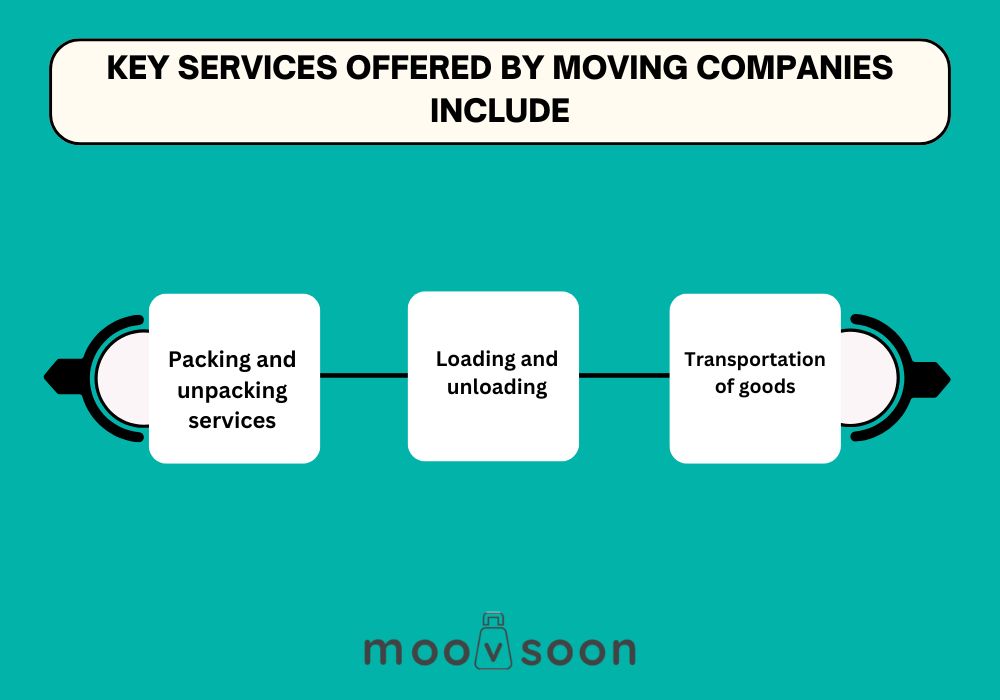
Key services offered by moving companies include:
- Packing and unpacking services: Professional movers provide expert packing to ensure items are securely packed to prevent damage during transit.
- Loading and unloading: They handle the heavy lifting, loading items onto the moving truck, and unloading them at the destination.
- Transportation of goods: Moving companies ensure the safe and efficient transport of personal and business belongings.
These companies cater to various types of moves, such as local, long-distance, and international relocations. Their expertise ensures the safe and efficient transport of personal and business belongings. According to the Better Business Bureau (BBB), it is crucial to verify the credentials of moving companies to ensure reliability.
Types of Moving Companies:
- Local movers: Focus on short-distance moves within a specific area, such as a city or metropolitan region.
- Long-distance movers: Handle relocations across state lines or countries, often involving more extensive logistics.
- International movers: Specialize in managing the complexities of cross-border relocations, including customs regulations.
- Specialty movers: Cater to transporting delicate, valuable, or oversized items, providing customized solutions for unique moving needs, such as pianos or artwork.
Are all moving companies licensed and insured?
Yes, most moving companies are licensed and insured, ensuring legal compliance and protection for your belongings. As suggested by Moving.com, always verify the licensing and insurance status of a moving company before hiring them.
Can moving companies handle international relocations?
Yes, many moving companies handle international relocations, managing logistics and customs regulations for smooth transitions. In commercial relocations, moving companies offer comprehensive services to ensure a seamless move across borders.
Does a moving company need insurance? Yes, a moving company needs insurance to cover potential damages or losses. Types of insurance include liability and cargo insurance. Insurance provides peace of mind and safeguards belongings during relocations. According to the American Moving and Storage Association, over 40 million moves occur annually in the United States, highlighting the critical role of insurance in safeguarding these relocations.
How can a moving company expand its services?
A moving company can expand its services by offering packing and unpacking, storage solutions, specialized moving services, long-distance or international moves, and corporate relocation services.
Expanding services can help a moving company attract more customers, increase revenue, and stay competitive in the market. By diversifying offerings, companies can address a broader range of customer needs and stand out from competitors.
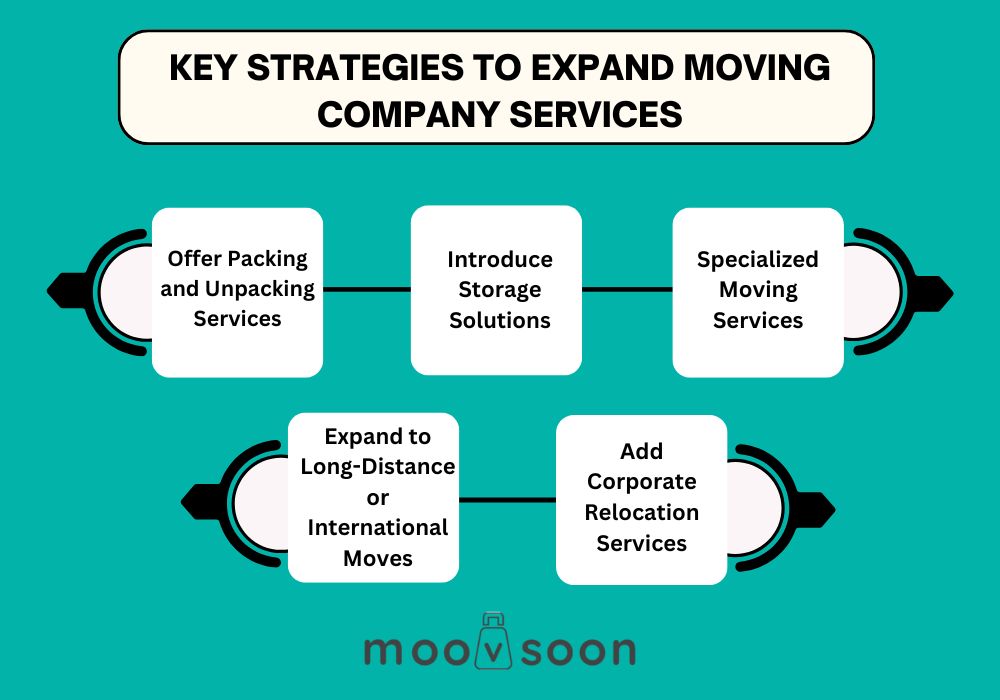
Key Strategies to Expand Moving Company Services:
- Offer Packing and Unpacking Services: Adding packing and unpacking services allows you to provide a more comprehensive moving experience. Supplying materials and professional packing caters to customers seeking a full-service solution. According to Moving.com, companies that offer additional services like packing often see a significant increase in customer satisfaction.
- Introduce Storage Solutions: By offering storage solutions, you can cater to customers who require temporary or long-term storage options. This flexibility can attract clients needing a secure place for their belongings between moves. Research from the American Moving & Storage Association suggests that storage services can be a substantial revenue stream for moving companies.
- Specialized Moving Services: Specializing in the moving of unique items, such as pianos or artwork, can help you stand out. These services require expertise and care, appealing to customers with specific needs. As recommended by the Small Business Administration (SBA), offering specialized services can enhance your market position.
- Expand to Long-Distance or International Moves: Expanding to long-distance or international moves allows you to tap into a broader market. This can significantly increase your customer base and revenue potential. According to Allied Van Lines, companies that offer international moves often experience higher profit margins.
- Add Corporate Relocation Services: Offering corporate relocation services enables you to attract business clients by providing tailored solutions for office moves or employee relocations. This can lead to lucrative contracts and repeat business. For urban markets, consider offering specialized corporate packages to meet the high demand.
Additional Revenue Streams:
- Selling Packing Supplies: Selling packing supplies like boxes, tape, and bubble wrap can create an additional revenue stream. Customers appreciate the convenience of purchasing these items directly from their moving company. This is a common practice among successful moving companies.
- Offering Cleaning Services: Providing cleaning services for homes and offices before or after a move can diversify income. This adds value for customers looking for a seamless transition to their new space. In high-demand areas, adding specialized cleaning services can further enhance customer satisfaction and loyalty.
Benefits of Expanding Services:
- Increased Customer Satisfaction: Expanding services can lead to higher customer satisfaction by meeting more diverse needs. This comprehensive approach can result in repeat business and positive referrals. According to industry surveys, companies with diversified services tend to receive better customer reviews.
- Improved Brand Reputation: Offering a wide range of services can improve your brand reputation. Customers are more likely to trust a company that provides comprehensive, high-quality solutions. This can lead to increased market share and customer loyalty.
- Greater Market Reach: Diversifying your services allows you to reach a broader market. This can help you attract various customer segments, from individual clients to large corporations. Service diversification is a proven strategy for market expansion.
Can offering storage solutions increase revenue?
Yes, offering storage solutions can increase revenue by attracting customers who need temporary or long-term storage options.
Is it profitable to expand into international moves?
Yes, expanding into international moves can be profitable due to the higher demand and premiums associated with long-distance relocations.
How can a moving company ensure compliance with regulations?
A moving company ensures compliance by obtaining licenses, adhering to safety standards, and maintaining accurate records. These actions protect the company from legal issues and build customer trust.
Compliance is crucial for moving companies because it prevents fines, legal issues, and loss of customer trust. For example, a 2023 study by FMCSA found that 30% of moving companies failed initial inspections due to inadequate compliance, highlighting the importance of regulatory adherence.
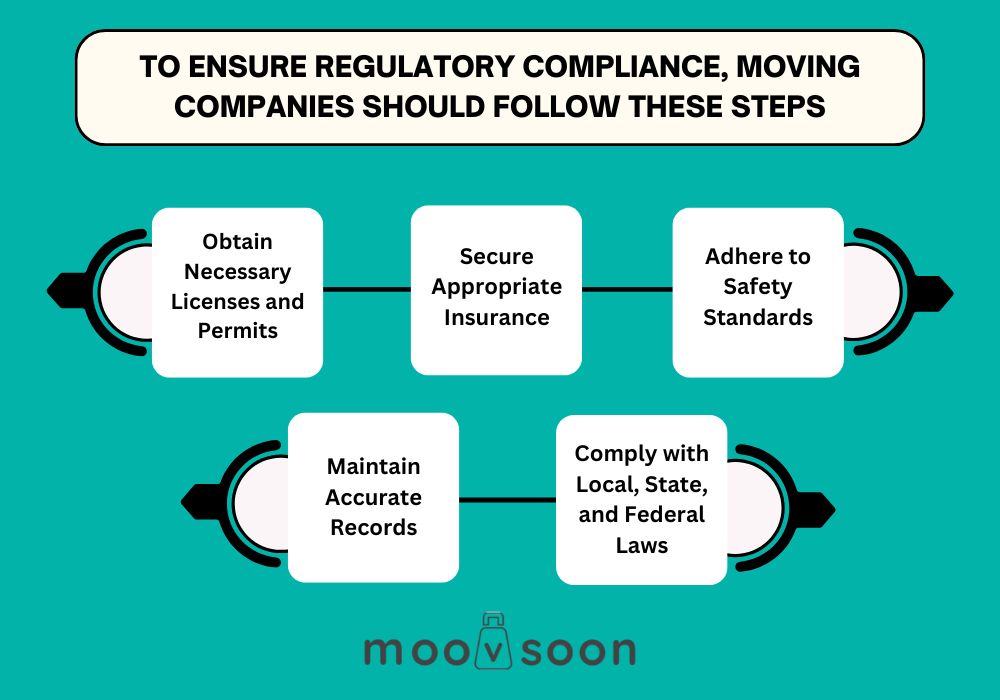
To ensure regulatory compliance, moving companies should follow these steps:
- Obtain Necessary Licenses and Permits: Obtain licenses from state regulatory bodies and the FMCSA to operate legally.
- Secure Appropriate Insurance: Ensure adequate cargo and liability insurance to cover potential damages during transit.
- Adhere to Safety Standards: Regularly inspect vehicles and train staff in accordance with DOT requirements to ensure safety compliance.
- Maintain Accurate Records: Keep detailed records of all transactions and inspections to demonstrate compliance.
- Comply with Local, State, and Federal Laws: Ensure all operations align with federal (e.g., FMCSA), state, and local regulations.
Following these steps helps moving companies avoid penalties and maintain a good reputation.
Moving companies must have various insurance coverages, including liability insurance, cargo insurance, and workers’ compensation. Liability insurance covers damages or injuries during moving, while cargo insurance protects the value of goods during transport.
How does a moving company operate?
A moving company operates by planning, packing, transporting, and unloading items. It involves inventory assessment, coordination, specialized packing, secure transportation, and careful unloading.
The moving company industry focuses on facilitating residential and commercial relocations. It has grown significantly due to increased urban mobility. FMCSA regulations ensure operational safety and compliance.
Understanding the key steps in how a moving company operates is crucial for efficient relocation.
- Initial Consultation and Inventory: During the initial consultation, an agent evaluates the volume of items and provides a cost estimate.
- Planning and Coordination: Coordination involves digital tools to assign tasks and monitor progress.
- Packing and Preparation: Items are packed with specialized materials such as bubble wrap and crates.
- Transportation and Delivery: Specialized trucks ensure the secure transit of goods.
- Unloading and Setup: Upon delivery, items are carefully unloaded and placed according to the client’s instructions.
These steps ensure that moving companies provide safe, efficient, and satisfactory relocation services.
Many moving companies offer specialized services such as long-distance moving and corporate relocation. Long-distance moving involves transporting belongings across state lines or over 100 miles, often requiring additional permits. According to the 2024 Atlas Corporate Relocation Survey, 44% of employers expect an increase in permanent voluntary relocations compared to 2023, reflecting a growing preference for full-service moving options among employees.
Movers prepare for a move by conducting thorough inventories, selecting appropriate packing materials, and coordinating logistics to ensure timely arrival. Pre-move activities include route planning, vehicle checks, and client communication. Movers adhere to FMCSA guidelines for safe packing and transport.
To manage logistics and scheduling, moving companies utilize logistics software, GPS tracking, and communication platforms. Teams coordinate using mobile apps that provide real-time route updates. ABC Moving Systems uses logistics software to streamline operations and reduce fuel costs. U-Haul reduced delays by 20% using dynamic routing software.
How do moving companies ensure the safety of belongings?
Moving companies ensure the safety of belongings by using professional packing, secure transportation, and insurance coverage. These measures minimize risks and provide peace of mind for customers.
Ensuring the safety of belongings is critical for moving companies because it builds customer trust, meets legal obligations, and maintains reputation. FMCSA regulations set safety standards that companies must follow. For example, moving companies often use trained personnel to reduce damage risk during transit.
Moving companies use a variety of specialized packing materials such as bubble wrap, reinforced boxes, packing paper, and foam inserts. Full value protection covers the full repair or replacement of damaged items. According to AMSA, professional packing services can reduce damage claims by 50%.
Movers protect fragile items by using custom crating, double-wrapping, and padded blankets. For instance, U-Haul uses shock-resistant packing for electronics, significantly reducing damage risk during transport. FMCSA regulations on handling fragile items ensure additional protection.
Do moving companies work on Sundays?
Yes, most moving companies work on Sundays, but availability may depend on the company, location, and demand. Many national chains, like Roadway Moving, offer Sunday services. Local movers may also operate on Sundays, based on client needs.
Moving on a Sunday may involve extra fees due to higher demand or special scheduling requirements. Some local movers charge more for Sunday services, while some national chains, like Zip Moving & Storage, offer Sunday services without extra charges. Fees vary by location and company policies.
What are the key components of a moving company’s operations?
A moving company’s operations include planning, customer service, logistics, and equipment management. These components ensure efficient, reliable relocation services by coordinating resources, maintaining communication, and managing transportation effectively.
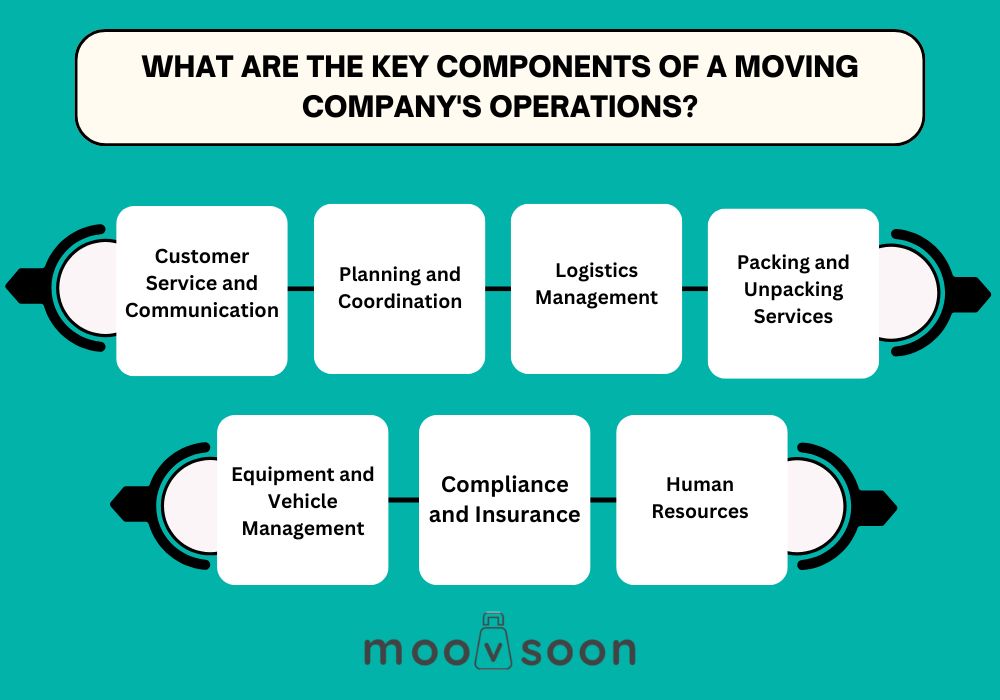
Understanding the key components of a moving company’s operations is crucial for delivering high-quality services and ensuring customer satisfaction.
- Customer Service and Communication: Effective customer service ensures clear communication and enhances client satisfaction by managing expectations and providing real-time updates. According to Zendesk, strong customer service increases client retention by 60%.
- Planning and Coordination: Planning and coordination involve scheduling, route mapping, and team coordination. Moving companies use advanced scheduling tools to ensure timely and efficient relocations.
- Logistics Management: Logistics management encompasses managing transport, handling storage, and ensuring timely deliveries. According to the American Moving & Storage Association, effective logistics management reduces moving costs by 15%.
- Packing and Unpacking Services: Packing and unpacking services ensure that all items are securely packed using specialized materials like bubble wrap and heavy-duty boxes, preventing damage during transit.
- Equipment and Vehicle Management: Equipment and vehicle management includes the maintenance of trucks, dollies, and specialized tools. Proper management ensures safety and efficiency during moves.
- Compliance and Insurance: Compliance and insurance are critical because they protect customers’ belongings and ensure adherence to regulations. Moving companies must comply with FMCSA regulations to ensure legal operation.
- Human Resources: Human resources involve hiring, training, and maintaining safety standards. Effective training programs help reduce damage claims by 30%, enhancing operational efficiency.
These elements are vital to ensuring that moving companies provide efficient, reliable, and satisfactory relocation services.
The essential operational processes in a moving company include customer service, logistics management, planning, and equipment management. Customer service involves clear communication and managing client expectations. Logistics management ensures timely deliveries and cost efficiency. Planning coordinates schedules and routes. Equipment management maintains trucks and tools.
According to the American Moving & Storage Association, effective logistics management can reduce moving costs by 15%, highlighting its importance in the industry.
How do you determine pricing for moving services?
Moving service pricing is primarily determined by distance, volume, timing, accessibility, insurance, and storage needs. These factors significantly influence the cost of moving and should be considered when planning a relocation.
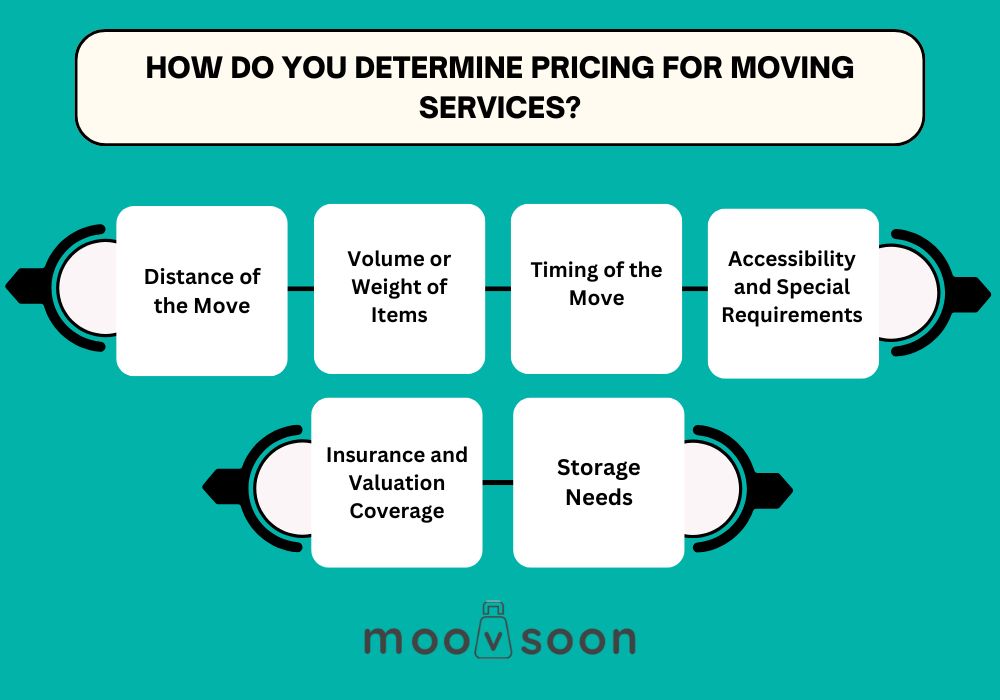
Understanding the factors that influence moving costs can help customers plan and manage expenses effectively. Various elements can significantly affect the overall cost of moving services.
- Distance of the Move: The cost increases with distance due to fuel, time, and logistics for long-distance moves compared to local moves. Longer distances require more resources and planning.
- Volume or Weight of Items: The amount of belongings directly affects costs. A larger truck may be required for homes with more furniture, impacting both truck size and crew size.
- Timing of the Move: Moving during busy seasons or weekends raises rates due to increased demand. Peak times often lead to higher pricing, reflecting the services’ heightened demand.
- Accessibility and Special Requirements: Hard-to-reach locations or the need for specialized equipment add charges. Complex moves require additional labor and time, increasing overall costs.
- Insurance and Valuation Coverage: Additional coverage for damage or loss affects cost. Options like basic liability or full-value protection clarify the importance of understanding valuation coverage.
- Storage Needs: If storage services are required, costs increase accordingly. Short-term or long-term storage needs significantly impact the total price of the moving service.
These factors are critical in determining moving service costs, allowing customers to estimate their expenses accurately.
Can Moving Companies Charge a Flat Rate? Yes, moving companies may offer flat rates for straightforward moves with defined parameters, such as fixed distances and item counts. Complex moves typically utilize itemized pricing to account for varying factors affecting costs.
What are the startup costs for a moving company?
The startup costs for a moving company, also known as a relocation service provider, typically range from $10,000 to $50,000, depending on the scale and location of the business.
Several factors affect the startup costs of a moving company, including the size of the business, location, and services offered. Key expenses include vehicle acquisition, licensing, insurance, equipment, and marketing.
Detailed Breakdown of Moving Company Startup Costs:
- Vehicle Purchase or Lease: A significant startup expense is the cost of acquiring moving trucks, which can range from $20,000 to $50,000 per truck. For smaller operations, consider used trucks to reduce costs.
- Licensing and Permits: Obtaining the required licenses and permits can cost between $500 to $2,000, covering USDOT numbers and state-specific licenses. As suggested by Moving.com, compliance with local regulations is essential.
- Insurance Coverage: Insurance is a crucial expense, with premiums typically ranging from $5,000 to $10,000 per year for liability, cargo, and vehicle insurance. According to the Better Business Bureau (BBB), insurance is mandatory to protect against various risks.
- Equipment and Supplies: Essential moving equipment and supplies, such as dollies and packing materials, can cost between $1,000 to $5,000. Consider starting with basic equipment and upgrading as the business grows.
- Marketing and Advertising: To attract customers, marketing and advertising costs may range from $2,000 to $5,000, including website creation and digital marketing. See our guide on Starting a Moving Company for tips on effective marketing strategies.
Ongoing expenses like employee wages and fuel can vary depending on the number of employees and the distances traveled. Office rent is another variable cost that depends on the location and size of the office space.
In total, the startup costs for a moving company can range from $10,000 to $50,000, depending on various factors such as business size and location.
To manage costs effectively, consider buying used trucks and equipment or using digital marketing to minimize expenses. Leasing instead of purchasing trucks can also reduce initial costs.
Can you start a moving company with less than $10,000?
Yes, it is possible to start a small moving company with less than $10,000 by minimizing expenses and starting with essential items only. Studies show that starting small and scaling up can be a successful strategy.
Is insurance mandatory for all moving companies?
Yes, insurance is mandatory for all moving companies to cover liability, cargo, and vehicle-related risks. According to the American Moving & Storage Association, adequate insurance is crucial for business credibility and protection.
Do you need a USDOT number to start a moving company?
Yes, you need a USDOT number to start a moving company, especially if you plan to operate across state lines. This federal requirement ensures compliance with safety and regulatory standards.
How do you secure financing for startup costs?
Securing financing for startup costs can be achieved through various methods, including personal savings, business loans, and seeking investors.

Understanding these options is crucial for establishing a successful business.
- Personal Savings: Using personal savings is often the first source of capital. This method avoids debt but risks depleting personal finances.
- Business Loans: Traditional business loans require a solid application showcasing your business plan. Approximately 29% of small businesses utilize bank loans for initial funding.
- Small Business Grants: Small business grants are often available through government programs. While competitive, these grants offer non-repayable funding, such as SBA grants for specific industries.
- Angel Investors and Venture Capital: Angel investors and venture capitalists provide funding in exchange for equity. Investors typically seek businesses with high growth potential and a clear exit strategy.
- Crowdfunding: Crowdfunding platforms like Kickstarter allow businesses to raise funds from the public. Successful campaigns include tech gadgets and innovative consumer products.
- Business Credit Cards: Business credit cards provide quick access to funds but come with high interest rates. Responsible management is crucial to avoid debt accumulation.
- Friends and Family: Borrowing from friends and family is a viable option. Creating formal loan agreements with clear terms helps maintain relationships and avoid misunderstandings.
These financing methods offer diverse ways to fund a new moving company, from traditional loans to modern crowdfunding platforms.
To increase your chances of securing financing, improve your credit score, craft a strong business plan, and understand loan terms. For example, raising your credit score by paying off debts can enhance your borrowing capacity.
Can you start a moving company with minimal capital? It is possible to start a moving company with minimal capital by leasing vehicles, minimizing staff, and focusing on local moves. Strategies like operating lean while building up capital can ensure sustainability.
According to the Small Business Administration (SBA), 50% of small businesses rely on personal savings to fund startup costs. This statistic emphasizes the importance of personal financial management in entrepreneurship.
What are the most common financial mistakes made by new moving companies?
The most common financial mistakes made by new moving companies include underestimating costs, poor cash flow management, and inadequate pricing strategies.
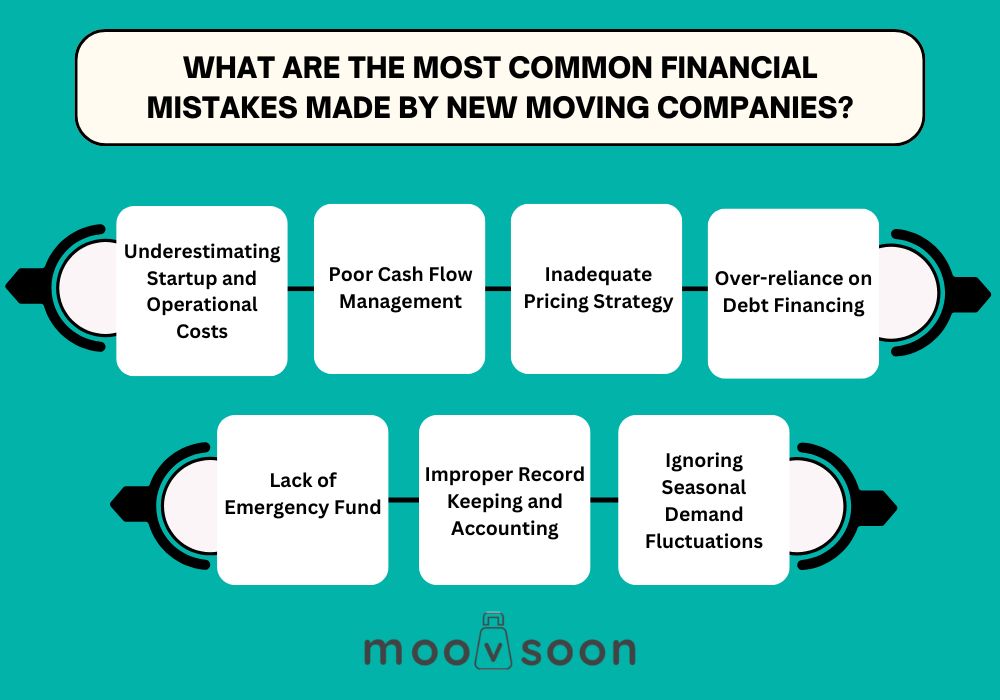
Financial management is crucial for new moving companies, and several common mistakes can negatively impact their growth. Understanding terms like “cash flow management” and “pricing strategy” is essential.
- Underestimating Startup and Operational Costs: New companies often underestimate the total costs, including fuel, maintenance, and equipment repairs. Overlooked expenses can accumulate, leading to financial strain and operational challenges.
- Poor Cash Flow Management: Failing to manage cash flow can lead to liquidity issues. Unbalanced inflow and outflow disrupt operations, with 82% of small business failures attributed to cash flow problems.
- Inadequate Pricing Strategy: Setting prices too low to attract customers undervalues services, resulting in unsustainable profit margins. Accurate calculations of overhead costs are crucial in developing effective pricing strategies.
- Over-reliance on Debt Financing: Relying heavily on debt accumulates unsustainable financial burdens. Balancing debt with revenue generation and exploring alternative financing options is critical for long-term viability.
- Lack of Emergency Fund: Without an emergency fund, companies struggle with unexpected expenses. Setting aside cash can prevent financial strain during crises, such as vehicle breakdowns or sudden regulatory costs.
- Improper Record Keeping and Accounting: Inadequate accounting practices can lead to tax issues and cash flow discrepancies. Keeping accurate financial records is vital; consider using accounting software to streamline this process.
- Ignoring Seasonal Demand Fluctuations: Many moving companies overlook the impact of seasonal demand. Adjusting staffing and budgeting for peak and off-peak seasons is crucial for maintaining financial stability.
Avoiding these common mistakes can help new moving companies establish a solid financial foundation and promote long-term growth.
To avoid financial pitfalls, create a detailed budget, regularly review financial statements, and consult with a financial advisor. Tools like budgeting software and professional services can enhance financial management and ensure sustainability in operations.
How can a moving company improve customer satisfaction?
A moving company can improve customer satisfaction through effective communication, delivering quality service, and handling customer feedback.
Customer satisfaction is crucial for a moving company as it leads to positive reviews, repeat business, and referrals, all essential for long-term growth. Terms like “customer satisfaction” refer to how well a company’s services meet customer expectations, while “CRM software” aids in managing customer relationships.
- Effective Communication: Clear and frequent communication helps build trust. Providing updates on schedules and handling customer queries promptly enhances satisfaction.
- Deliver Quality Service: Delivering reliable, high-quality service ensures customer belongings are moved safely and on time. Consistency in service improves customer loyalty and increases positive feedback.
- Set Clear Expectations: Setting clear expectations about pricing, timelines, and services reduces misunderstandings. Transparency throughout the moving process avoids dissatisfaction.
- Offer Personalized Services: Offering personalized services such as customized packing options enhances the customer experience. Catering to individual needs increases the likelihood of positive reviews.
- Handle Feedback Proactively: Responding to both positive and negative feedback promptly builds trust. Addressing customer concerns shows commitment to continual improvement.
- Implement Follow-Up Procedures: Following up after the move to ensure satisfaction strengthens relationships. Checking in improves customer loyalty and can lead to repeat business.
- Use Technology for Efficiency: Utilizing CRM software and automation tools streamlines scheduling, tracking, and communication. This improves operational efficiency and customer satisfaction.
Implementing these strategies can lead to greater customer satisfaction, driving positive reviews, repeat business, and growth.
To enhance customer experience further, consider offering discounts for repeat customers, providing value-added services like moving checklists, and delivering packing guides to help customers prepare for the move effectively.
According to a 2024 study by the American Moving & Storage Association, companies that implement effective communication strategies see a 25% increase in customer satisfaction ratings.
What is the importance of customer reviews for a moving company?
Customer reviews are essential for a moving company because they build trust, enhance online visibility, and improve service quality. Positive reviews attract new clients, increase booking rates, and provide valuable feedback for improving operations.
Customer reviews directly affect how potential clients perceive a moving company’s reliability and service quality. Reviews serve as social proof and boost local SEO, making a company appear more trustworthy and visible online. According to BrightLocal, 87% of consumers read online reviews for local businesses.
To encourage more reviews, companies can provide excellent service, request feedback post-service, and offer incentives. Practical methods include sending review requests after a move, offering discounts for future services, and engaging with clients on social media platforms.
How do moving companies generate leads?
Generating leads is vital for moving companies because it drives business growth and customer acquisition. Lead generation strategies involve various methods targeting potential customers at different decision-making stages. A diversified approach ensures the effective attraction of new clients.
- Search Engine Optimization (SEO): SEO involves optimizing a company’s website and content to rank higher on search engine results pages (SERPs). Optimizing website content with relevant keywords helps moving companies appear in more local search results. Companies with strong SEO see an average of 30% more organic traffic.
- Pay-Per-Click (PPC) Advertising: PPC advertising allows companies to pay for each click on their ads, which can be targeted based on location, keywords, or customer demographics. Through PPC campaigns, moving companies can target specific search terms like “affordable movers near me.” This strategy offers instant visibility and measurable ROI.
- Content Marketing: Content marketing focuses on creating valuable content (blogs, videos, guides) to attract potential customers. According to HubSpot, companies that blog regularly receive 67% more leads than those that don’t. This approach builds trust and authority, enhancing organic lead generation.
- Social Media Marketing: Social media marketing involves using platforms like Facebook and Instagram to engage with potential customers and promote services. A moving company can use Facebook ads to target local audiences and create awareness about special offers. Successful social media campaigns can significantly boost customer engagement.
- Referral Programs: Referral programs encourage satisfied customers to refer others by offering incentives such as discounts or gift cards. A referral program could offer a 10% discount to both the referrer and the referred client. This strategy effectively builds trust and expands the customer base.
- Partnerships with Real Estate Agents: Partnerships with real estate agents can provide access to potential leads. Real estate agents can recommend a trusted moving company to their clients, while movers can refer clients looking to buy or rent. Effective mutual referrals can significantly increase customer acquisition.
- Email Marketing: Email marketing involves using email campaigns to reach out to potential and existing customers. Sending personalized emails with special moving deals or tips can engage potential customers. Email marketing has an average ROI of $42 for every $1 spent, demonstrating its effectiveness.
- Online Directories and Listings: Online directories and listings help moving companies gain local visibility. Being listed on high-traffic platforms like Yelp increases visibility among local clients searching for moving services. Positive customer reviews on these platforms enhance credibility and attract more leads.
- Local Community Engagement: Local community engagement involves participating in events, sponsorships, or partnerships within the community. Participating in community events can enhance brand visibility and foster trust within the local market. Local engagement strategies can effectively promote services to nearby residents.
These diverse strategies ensure moving companies can effectively reach and engage with potential customers at all stages of their decision-making process.
To maximize lead generation, moving companies should optimize landing pages, use lead capture forms, and implement follow-up systems. Optimizing landing pages with clear calls to action, using pop-up lead capture forms, and implementing automated follow-up emails can increase conversion rates by up to X%. Real-world examples and data support these strategies for effective lead generation.
Can moving companies buy leads?
Moving companies can buy leads from lead generation companies, online marketplaces, and aggregators. Buying leads can provide quick access to potential customers but may involve risks like high competition and varying lead quality.
The process of buying leads involves acquiring contact information of potential customers who have expressed interest in moving services through various channels (e.g., websites, online forms, and aggregators). Lead providers gather data from online inquiries, surveys, and service comparison sites to compile a list of potential customers.
What are the pros of buying leads?
Buying leads offers several advantages, including:
- Quick Access to Potential Customers: Purchasing leads allows moving companies to skip the time-consuming prospecting phase and connect immediately with potential clients actively seeking moving services.
- Targeted Leads: By buying leads that match specific criteria, moving companies can increase their chances of conversion and reduce cost-per-acquisition.
- Scalability: If a moving company needs to ramp up its operations, it can purchase additional leads to match the increased capacity and adapt quickly to demand fluctuations.
These advantages make buying leads a flexible and quick option for companies seeking to expand their customer base.
What are the cons of buying leads?
Despite its benefits, buying leads also comes with several drawbacks:
- Quality and Competition: Purchased leads often lack exclusivity, resulting in higher competition among moving companies for the same customers, which can dilute lead effectiveness.
- Cost Considerations: While buying leads can be effective, the costs can add up quickly, especially for high-quality or exclusive leads, impacting overall profitability and budget management.
- Dependence on External Sources: Relying solely on bought leads may create vulnerability if lead quality declines or the cost increases, affecting long-term lead generation strategies.
These drawbacks highlight the need for careful consideration when choosing to buy leads.
Conclusion
A moving company provides essential relocation services that include packing, transporting, and unloading. Key operational components such as logistics management ensure efficient scheduling and routing, while safety protocols protect belongings. Compliance with regulations, like those from the FMCSA, guarantees legal operation and customer trust.
Financial planning is crucial for moving companies, covering startup costs such as vehicles, equipment, insurance, and licensing fees. Effective pricing strategies account for factors like distance, volume, and special services. Securing financing through bank loans or grants is essential. Common financial pitfalls to avoid include underestimating costs and poor cash flow management.
Customer engagement is key to business growth, and moving companies can enhance satisfaction by providing excellent service, effective communication, and prompt resolution of complaints. Lead generation techniques such as SEO, PPC, and partnerships are vital. Positive customer reviews build trust and attract new clients. Service expansion opportunities, such as offering packing or storage services, and flexible operational schedules can further enhance growth and market reach.
